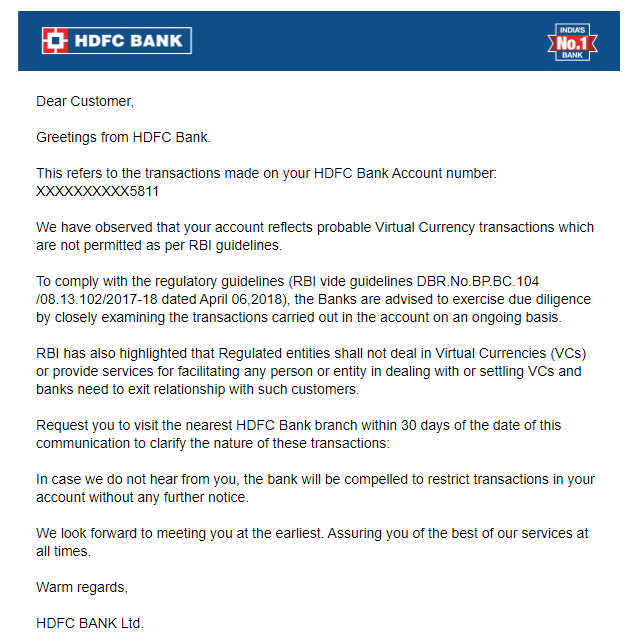The news gives crypto enthusiasts in the country a more simple way to use the digital assets.
Don’t Use That Circular
The Reserve Bank of India (RBI) gave a boost to crypto users this week with clarification that commercial banks should cease cautioning consumers with an outdated RBI circular. The April 6th, 2018 circular specifically restricted banks and other financial institutions from dealing with crypto clients, but this edict was later overturned on March 4th, 2020, by India’s Supreme Court.
Banking Confusion
The clarification from the RBI highlights the difficulties that crypto users often have when engaging with the legacy banking system, both in India and elsewhere. This most recent example was sparked when Twitter user Sanat Mehrotra revealed that the HDFC Bank were using the outdated circular to threaten him with cessation of banking services. The HDFC Bank demanded that Mr Mehrotra attend a branch in person to explain his transactions within 30 days or “the bank would be compelled to restrict transactions in your account without any further notice.”

The fresh statement from RBI makes it clear that banks should not use the 2018 circular to justify this type of action. While this will be welcomed by crypto and banking customers, it should be treated with caution since it in no way prevents banks from restricting services they may dislike for other reasons.
In fact, the RBI states:
“Banks, as well as other entities addressed above, may, however, continue to carry out customer due diligence processes in line with regulations governing standards for Know Your Customer (KYC), Anti-Money Laundering (AML), Combating of Financing of Terrorism (CFT) and obligations of regulated entities under Prevention of Money Laundering Act, (PMLA), 2002 in addition to ensuring compliance with relevant provisions under Foreign Exchange Management Act (FEMA) for overseas remittances.”
The issue for ordinary users is trying to predict which legitimate banking behaviors might unduly concern their own banking institutions. Reception of crypto from governmental authorities has been mixed at times, and banking institutions currently hold a lot of power in determining the future of digital assets.
Original Circular and Retraction
The original document from RBI which has caused the recent confusion made a number of references to virtual currencies, or VCs. The relevant passage reads:
“In view of the associated risks, it has been decided that, with immediate effect, entities regulated by the Reserve Bank shall not deal in VCs or provide services for facilitating any person or entity in dealing with or settling VCs. Such services include maintaining accounts, registering, trading, settling, clearing, giving loans against virtual tokens, accepting them as collateral, opening accounts of exchanges dealing with them and transfer / receipt of money in accounts relating to purchase/ sale of VCs.”
The clarification which came from the bank on May 31st is as follows:
“Such references to the above circular by banks/ regulated entities are not in order as this circular was set aside by the Hon’ble Supreme Court on March 04, 2020 in the matter of Writ Petition (Civil) No.528 of 2018 (Internet and Mobile Association of India v. Reserve Bank of India). As such, in view of the order of the Hon’ble Supreme Court, the circular is no longer valid from the date of the Supreme Court judgement, and therefore cannot be cited or quoted from.”
The retraction can be compared to Starling Digital Bank retracting their ban on crypto deposits recently, which does seem to indicate a more positive attitude towards crypto on a general level by financial authorities.
Final Thoughts
The recent statement from the RBI clearly explains that Indian banks and financial institutions should not use its 2018 circular to bully consumers. While this remains a highly welcome intervention, it does not mean that India’s banking customers can rest easy knowing that their banks will not flag crypto transitions in the future. That is the peace of mind that this intervention cannot offer, and that will only come with mass adoption and regulation by local authorities.
Source : bsc.news

Founded in 2020, BSCNews is the leading media platform covering decentralized finance (DeFi) on the Binance Smart Chain (BSC). We cover a wide range of blockchain news revolving mainly around the DeFi sector of the crypto markets. BSCNews aims to inform, educate and share information with the global investment community through our website, social media, newsletters, podcasts, research, and live ask me anything (AMA). Our content reaches hundreds of thousands of global investors who are active in the BSC DeFi space.
BSC NEWS is a private news network. All posts posted by this user belong 100% to bsc.news All rights are reserved to BSC NEWS for more information about BSC NEWS contact BSC NEWS HERE.



